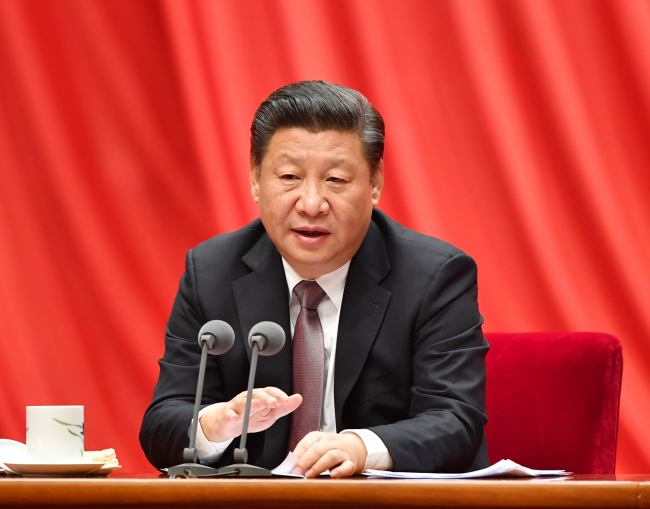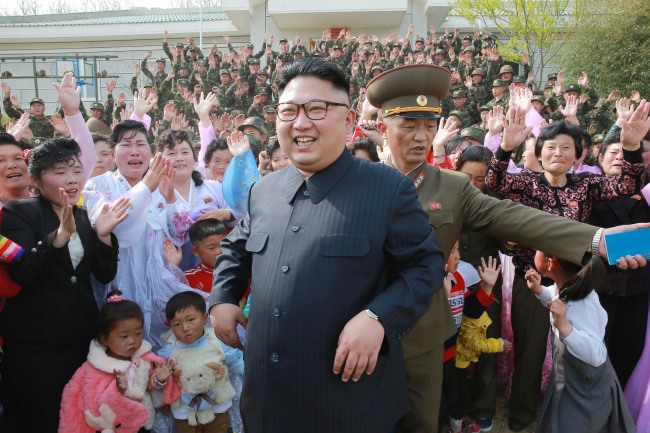With China embarking on a gargantuan enterprise of infrastructure and international development through the “Belt and Road” initiative, Beijing, Pyongyang and Seoul could join hands to tap its immense economic potential and promote regional trust-building and integration, according to a North Korea expert.
Professor Fang Haofan, dean of the school of political science and public administration at Yanbian University, stressed that the more Seoul harped on its unification rhetoric, the further it will drift away, as Pyongyang would suspect Seoul’s intention and interpret it as a strategy to topple the regime. He also gives policy advice to the central government in Beijing on North Korea matters.
In an interview with The Korea Herald, the Korean-Chinese academic argued that similar to relations governing China and Taiwan, more cooperation and exchange between the two Koreas would cultivate amity toward integration.
In this vein, the Silk Road Economic Belt and 21st-century Maritime Silk Road plan, simply known as the “One Belt, One Road,” would be an ideal vehicle to materialize future cooperation, he said on the sidelines of an academic seminar in Busan.
 |
Professor Fang Haofan, dean of the school of political science and public administration at Yanbian University in Jilin province, China (Joel Lee/The Korea Herald) |
“When one side declares unification as its policy, unification will never come,” the 53-year-old said Friday following a conference organized by the Korean Association for Local Government Studies at Dong-a University in Busan, which gathered nearly 100 scholars and policy advisers in Korea.
“It’s obvious. Exchange and collaboration are prerequisite to peaceful unification. Unification could follow given enough efforts to mend fences.”
Yanbian University is located in the Yanbian Korean Autonomous Prefecture in Jilin province, and is the only university in China using Korean as an official language of instruction alongside Chinese. The school has affiliations with universities in South Korea and North Korea.
The belt and road initiative, which Chinese President Xi Jinping triumphantly touted at the maiden summit in Beijing on May 14, summoned 28 world leaders, including a North Korean delegation. The $124 billion scheme aims to forge “paths of peace, inclusiveness and free trade” across Asia, Africa, Europe and beyond through infrastructure development and systems of “fair, reasonable and transparent global trade and investment rules.”
Some Asian countries, notably India, did not participate, leery of Beijing’s growing regional clout that could encroach their sphere of influence. To address these concerns, Xi said in his opening speech, “We are ready to share practices of development with other countries, but harbor no intention to interfere in their internal affairs, export our social system, or impose our will on others.”
“What we hope to achieve is a new model of win-win cooperation,” Xi contended.
 |
Chinese President Xi Jinping (Yonhap Photo) |
Analysts note that China aims to offer an alternative model of global development previously championed by the US, and also find new solutions to slowing growth at home by exporting its infrastructure development expertise that has spearheaded three decades of rapid domestic growth.
“Xi’s vision is creating a global community of a common destiny,” the professor explained, adding the undertaking could extend to the Korean Peninsula through both land and sea. “If North Korea and South Korea took part in the initiative through railways and seaborne routes, it would greatly benefit all participating economies.”
Regarding the new administration of President Moon Jae-in, Fang said his diplomatic balancing will be difficult between Washington and Beijing, complicated by the deployment of a US anti-missile system in Korea. Although the new leader would try to improve ties with Pyongyang by inheriting the “Sunshine Policy” of his predecessors Kim Dae-jung and Roh Moo-hyun, the volatile situations surrounding the peninsula stemming from the North’s advancing nuclear capabilities would be a major stumbling block, he forecast.
“Reconciliation might be possible with North Korea but we shouldn’t harbor such high hopes,” the professor advised.
More fundamentally, he floated the possibility that the recent demand made by President Donald Trump to Seoul to pay $1 billion for the Terminal High Altitude Area Defense system -- although denied by his national security adviser Herbert Raymond McMaster -- would be covertly factored into the bilateral defense cost-sharing agreement.
 |
North Korean leader Kim Jong-un (center) (Yonhap Photo) |
“There are many undisclosed ways the US could foot the bill to Korea,” he said, adding maintaining the system would be costly for years to come. “South Korea investing in and strengthening its own defense capabilities would be much more effective in terms of both the objective and cost.”
As for Beijing’s stance on THAAD, Fang said the Communist Party views the weapons system as the US’ tool to encircle China, a furtherance of Washington’s “pivot to Asia” strategy and part of its larger military structures across the Asia-Pacific region.
“We see it not for protecting Korea, as thousands of missiles coming at once won’t be effectively shot down. THAAD is ultimately for shielding the US mainland from incoming missiles.”
Emphasizing that the West’s sanctions have bolstered the North’s self-reliance and resilience, the academic said China views its wayward neighbor’s state of affairs with pity and concern, but that North Korea could not emulate China’s market-oriented reform and opening either.
“Every country has different problems and circumstances,” according to Fang. “Pyongyang is not in a situation to open itself, nor can it even if it wanted to. The outside world demands as a precondition its denuclearization, but the regime will not fall for that under current circumstances. The conditio sine qua non are greatly entangled.”
By Joel Lee (
joel@heraldcorp.com)








![[Exclusive] Hyundai Mobis eyes closer ties with BYD](http://res.heraldm.com/phpwas/restmb_idxmake.php?idx=644&simg=/content/image/2024/11/25/20241125050044_0.jpg)
![[Herald Interview] 'Trump will use tariffs as first line of defense for American manufacturing'](http://res.heraldm.com/phpwas/restmb_idxmake.php?idx=644&simg=/content/image/2024/11/26/20241126050017_0.jpg)
![[Herald Review] 'Gangnam B-Side' combines social realism with masterful suspense, performance](http://res.heraldm.com/phpwas/restmb_idxmake.php?idx=644&simg=/content/image/2024/11/25/20241125050072_0.jpg)